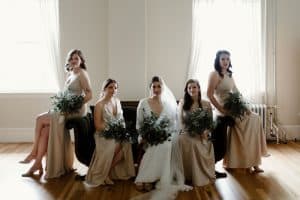Weddings are joyous occasions filled with love, laughter, and the celebration of two people embarking on a lifelong journey together. One of the cherished traditions surrounding weddings is the inclusion of a bridal party, with the bridesmaids standing by the bride’s side throughout the festivities.
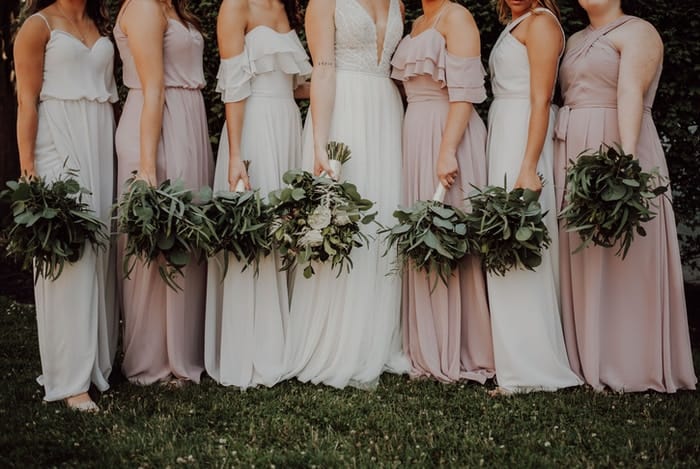
However, as societal norms continue to evolve, questions arise regarding who can partake in this role. One common query is whether a married woman can take on the role of a bridesmaid. In this blog post, we will delve into this intriguing question, examining the traditions, etiquette, and personal choices that shape the answer.
The Tradition of Bridesmaids
The concept of bridesmaids has been an integral part of weddings for centuries, steeped in rich tradition and cultural significance. In this section, we will delve into the historical roots of bridesmaids, their traditional roles and responsibilities, as well as the symbolism they carry in the wedding ceremony.
Historical Significance and Origins of Bridesmaids
Bridesmaids have a long history that can be traced back to ancient times. In ancient Rome, for example, bridesmaids played a vital role in protecting the bride from evil spirits. Similarly, in medieval Europe, bridesmaids were chosen to confuse potential kidnappers or suitors who may try to harm the bride. This historical context highlights the initial purpose of bridesmaids as guardians and protectors of the bride.
Traditional Role and Responsibilities of Bridesmaids
Traditionally, bridesmaids are chosen by the bride-to-be to provide support and assistance throughout the wedding planning process and on the big day itself. Their duties may include helping the bride with wedding preparations, attending bridal showers and bachelorette parties, and assisting the bride in getting dressed on the wedding day. During the ceremony, bridesmaids often walk down the aisle before the bride, symbolizing their support and readiness to assist her.
Symbolism and Support for The Bride-To-Be
Bridesmaids symbolize the bride’s closest friends or family members who are there to offer emotional support and ensure that the wedding day runs smoothly. They are seen as a symbol of friendship, loyalty, and solidarity with the bride as she transitions into married life. Bridesmaids also act as confidantes, providing guidance and a comforting presence during the wedding planning process.
Cultural Variations and Customs Related to Bridesmaids
Different cultures have their own unique customs and practices when it comes to bridesmaids. For example, in some cultures, such as the Filipino tradition, bridesmaids are called “sponsors” and have specific ceremonial roles during the wedding. In other cultures, the number of bridesmaids may vary, with some weddings featuring large groups of bridesmaids while others may have just one or two. Exploring these cultural variations highlights the diversity and significance of the bridesmaid tradition worldwide.
The Modern Interpretation
As society continues to evolve, so do the roles and expectations surrounding weddings. In recent years, there has been a noticeable shift in the interpretation of bridesmaids and a growing acceptance of including married women in this traditionally single role. In this section, we will explore the reasons behind this shift and the changing perspectives on marriage and marital status.
Breaking Away from Traditional Gender Roles
Modern weddings are increasingly challenging traditional gender norms and embracing more inclusive practices. The idea that bridesmaids must exclusively be unmarried women is rooted in the notion of young, single women being available for marriage themselves. However, as societal attitudes toward marriage and gender roles have become more flexible, the strict adherence to this tradition has started to fade.
Embracing Diversity and Inclusivity in Wedding Parties
Couples today are striving to create wedding parties that reflect their personal relationships and the diversity of their friendships. Including married women as bridesmaids allows for a more inclusive representation of the bride’s social circle, acknowledging the significance of friendships that transcend marital status. This shift promotes the idea that friendship and support should not be limited by whether or not someone is married.
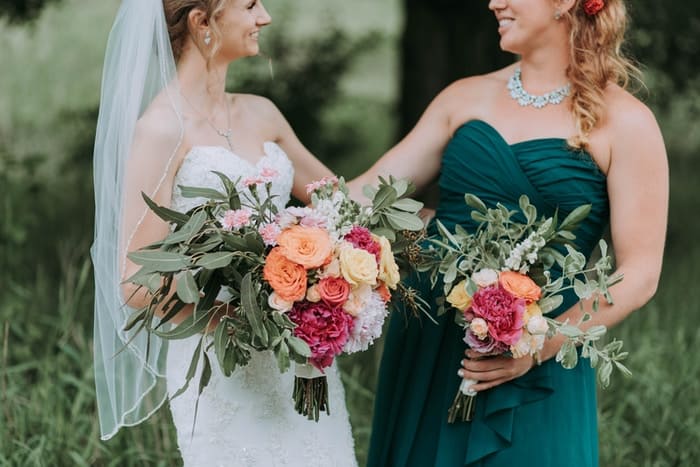
Shifting Perspectives on Marriage and Marital Status
Marriage is no longer seen as the ultimate goal or defining factor of a person’s identity. Many couples choose to marry later in life or opt for non-traditional partnerships. With this changing landscape, the idea that only unmarried women can fulfill the role of bridesmaids becomes less relevant. Recognizing that marriage does not diminish a person’s ability to offer support and friendship, many couples are embracing the inclusion of married women in their wedding parties.
The Rise of Unconventional Weddings and Non-Traditional Roles
As weddings become more personalized and reflective of the couple’s values and preferences, there is a growing trend of unconventional wedding parties. Couples are free to define their own roles and choose bridesmaids based on their personal relationships rather than adhering to strict traditions. This shift allows for greater flexibility and encourages couples to consider including married women who have played significant roles in their lives.
Pros of Including Married Women
Including married women as bridesmaids can bring unique benefits and perspectives to the wedding experience. These women bring a wealth of maturity, experience, and support that can enhance the bride’s journey leading up to the wedding day. In this section, we will explore the advantages of including married women in the bridal party.
A Mature and Experienced Perspective
Married women often have a wealth of life experiences and marital wisdom that can be invaluable during the wedding planning process. Their insight can help the bride navigate the various challenges that arise, offering advice and support based on their own experiences. Having someone who has already gone through the wedding planning process can provide a calming presence and reassurance to the bride.
Emotional Support and Guidance for The Bride
Marriage is a significant milestone, and having a married woman as a bridesmaid can offer the bride emotional support and guidance during this transition. Married women understand the complexities and emotions involved in planning a wedding and starting a new chapter in life. They can lend a sympathetic ear, provide encouragement, and offer practical advice to help alleviate stress and make the journey smoother.
Role Modeling a Successful Marriage
Including married women in the bridal party can serve as a positive representation of successful marriages. Their presence can showcase the beauty and strength of long-term commitments, inspiring the couple and guests with their example. This can be particularly meaningful for the bride and groom, as they embark on their own journey of marriage, surrounded by individuals who have experienced the joys and challenges of married life.
Strengthening Existing Friendships and Bond
Including married women as bridesmaids can deepen and strengthen existing friendships. It provides an opportunity to celebrate the enduring bonds that have stood the test of time, even after marriage. By including married friends, the bride can demonstrate the significance of their friendship and acknowledge the continued importance of their relationship, regardless of marital status.
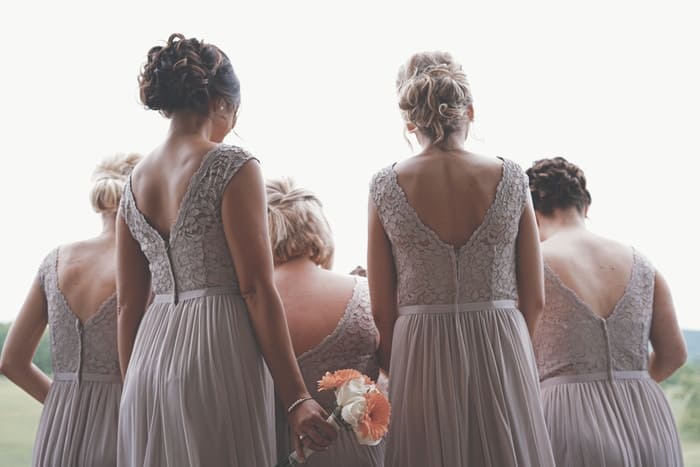
Addressing Concerns and Misconceptions
While including married women as bridesmaids can bring numerous benefits, there are also concerns and misconceptions that may arise. It’s important to address these apprehensions to ensure a harmonious wedding experience for everyone involved. In this section, we will explore common concerns and provide guidance on how to navigate potential challenges.
Perception of Married Women Stealing the Spotlight
One concern is that including married women as bridesmaids may divert attention away from the bride. It’s essential to emphasize that the role of bridesmaids is to support and enhance the bride’s experience, not overshadow her. Clear communication with all members of the bridal party, including married women, can help set expectations and ensure that the focus remains on the couple’s special day.
Confusion Regarding the Roles and Dynamics Within the Bridal Party
When including married women alongside single bridesmaids, there may be confusion about the dynamics and responsibilities within the bridal party. Clearly defining roles, expectations, and responsibilities for all bridesmaids, regardless of marital status, can help alleviate any potential misunderstandings. This can be achieved through open and honest conversations, ensuring that everyone is on the same page.
Potential Clashes Between Married and Single Bridesmaids
Differences in lifestyle or marital status can occasionally lead to misunderstandings or tensions within the bridal party. Encouraging open communication and fostering a supportive environment can help address any potential conflicts. Emphasizing the shared goal of celebrating the couple’s love and friendship can help bridge any gaps and foster unity among all bridesmaids.
Managing Expectations and Navigating Potential Challenges
Each wedding is unique, and there may be specific challenges or considerations that arise when including married women as bridesmaids. It’s important to manage expectations and address any potential obstacles proactively. By discussing concerns, preferences, and logistical considerations with all members of the bridal party, couples can find creative solutions that accommodate everyone’s needs and ensure a positive experience for all.
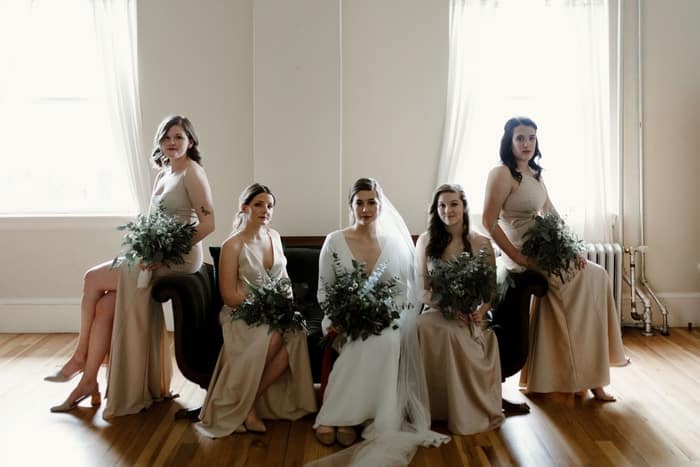
Etiquette and Practical Considerations
When including married women as bridesmaids, there are certain etiquette guidelines and practical considerations that can help ensure a seamless and enjoyable experience for everyone involved. In this section, we will explore the etiquette of including married women in the bridal party and provide practical tips for navigating this decision.
Open Communication with The Bride-To-Be
It is crucial for the bride-to-be to have open and honest conversations with all potential bridesmaids, including married women. This allows the bride to express her desires, explain her vision for the wedding, and discuss any concerns or expectations. This communication sets the stage for a supportive and understanding environment.
Discussing Expectations and Responsibilities in Advance
To avoid misunderstandings and ensure a smooth planning process, it’s important to discuss the expectations and responsibilities of bridesmaids, regardless of their marital status. This includes attending pre-wedding events, participating in dress fittings, and fulfilling any other duties assigned by the bride. Clarifying these expectations in advance helps establish a shared understanding among all bridesmaids.
Finding a Balance Between Married and Single Bridesmaids
When planning activities or events leading up to the wedding, consider the circumstances and preferences of both married and single bridesmaids. Strive to create a balance that accommodates everyone’s schedules and commitments. Being mindful of potential conflicts, such as conflicting family obligations or travel limitations, helps ensure the inclusion and participation of all bridesmaids.
Tailoring the Bridesmaid Experience to Suit Individual Circumstances
Every bridesmaid, married or single, may have unique circumstances that need to be considered. This could include factors such as pregnancy, childcare responsibilities, or work commitments. Taking these individual circumstances into account allows for flexibility and understanding, ensuring that all bridesmaids feel valued and included.
Conclusion
In conclusion, the question of whether a married woman can be a bridesmaid is not one that can be answered with a simple yes or no. It depends on various factors, including personal preferences, cultural and religious traditions, and the dynamics of each individual wedding. While some may adhere strictly to established conventions, others embrace the idea of inclusivity and celebrate the opportunity for married women to partake in this special role. Ultimately, the decision rests with the bride and those involved in the wedding planning process.


